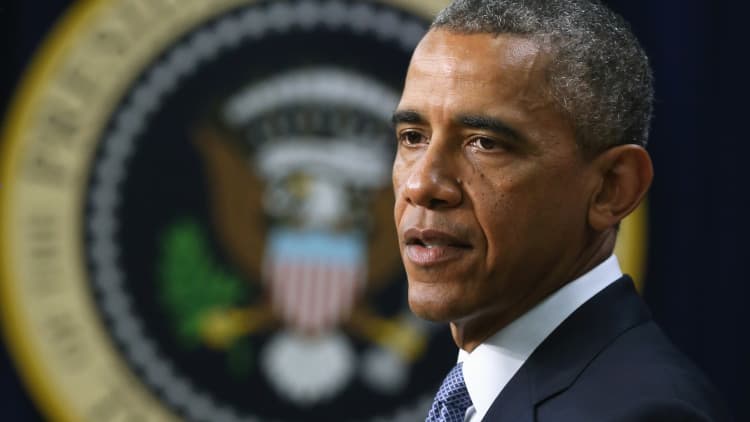President Barack Obama may want to rethink his position on trickle-down economics.
An avowed opponent of the principle that espouses putting money in the hands of those at the top in the hopes that it "trickles down" to those at the bottom, the Obama economy has benefited from that very principle
The stock market has soared 140 percent in the time Obama has been in office, the beneficiary of long-standing monetary policy that has rewarded those who own financial assets like stocks and penalized those who opt for safer instruments like savings accounts and money markets.
Stock market gains have been a bragging point recently for the president, who has launched an aggressive effort in recent days to try to boost his party in the upcoming mid-term elections.

Read MoreObama touts economic growth
Yet most of the market—about 90 percent by a recent count—is controlled by 20 percent of the people.
That top-tier group has been helped immensely by a president who has given at least tacit approval to monetary policy in which the Federal Reserve has kept interest rates anchored near zero for nearly six years and has inflated its balance sheet past $4 trillion in an effort to pump money into risk assets, and by extension the broader economy.
Obama nominated Ben Bernanke for a second term in 2010, and named Janet Yellen to succeed Bernanke earlier this year. Both are strong supporters of the so-called quantitative easing that has correlated closely with stock market gains.
"You can make a strong case that a lot of (the market gains are) because of Federal Reserve policy," said Greg Valliere, chief political strategist at Potomac Research Group. "The Fed has flooded the economy with liquidity and...easy credit that has gotten the economy back on its feet more than any kind of fiscal policy."
Read MoreFed 'behind the curve'—right where it wants to be
In fact, fiscal policy has been one hampered by gridlock, punctuated mostly with continuing resolutions that allow government spending to continue as the warring congressional factions spar over whom to tax and what to spend.
Obama has battled with Republicans frequently, painting them as advocates of the rich and enemies of the poor. He flatly proclaimed in an economic speech delivered in December 2011 that trickle-down economics "doesn't work. It has never worked."
Yet he's made the circuit recently bragging to CNBC and others about an economy on track to grow just 2 percent this year, while the stock market rallies and corporate profits are at a record high. On the other hand, he told The Economist in an interview that company CEOs should stop griping about the administration being anti-business.
Read MoreObama to CEOs: Quit complaining
"He has created an environment between his administration and business that is adversarial," Valliere said. "Business is very leery of this administration."
At the same time, making Americans in general feel confident about the economy will be a daunting challenge. Gallup's weekly confidence survey fell last week to its lowest level since December and suffered its largest weekly drop since the government shutdown last October.
"There's no question everything coming out of Washington for the next three months will be designed to influence the fall election," Valliere said. "Most Americans still feel the economy is not doing that great. I think he just wants to try to talk it up."
Read MoreObama to Republicans: 'Stop hatin' all the time'
As far as the market goes, Obama has benefited from several factors. In addition to taking over at a time when the market had plunged more than 50 percent from its record highs, expectations have remained low since then while the Fed has continued pumping money each time the market has shown significant weakness.
Obama's market ranks among the best of presidents dating back to William McKinley. Only Calvin Coolidge (268.6 percent), Bill Clinton (226.8 percent) and Franklin D. Roosevelt (202 percent) have done better.
"You can attribute some of the rally to low expectations amid data that hasn't been as bad as expected," said Todd Salamone, senior vice president of research at Schaeffer's Investment Research. "It's a multitude of factors. Just like it's hard to blame any one thing for the downturn, it's difficult to give credit to any one thing or person for the rally."
—By CNBC's Jeff Cox






